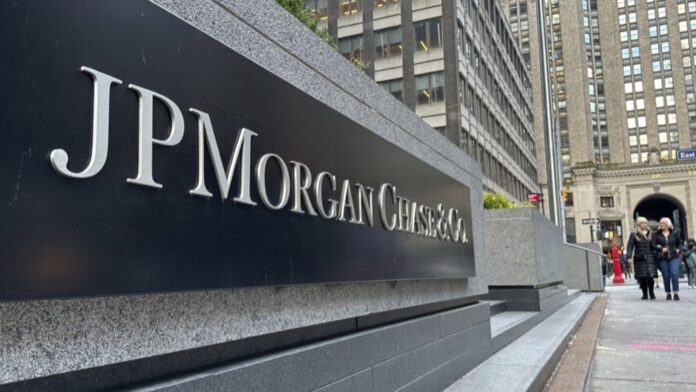NEW YORK (AP) — On Friday, JPMorgan Chase reported a slight decline in its net income for the third quarter, which decreased by 2% as the bank increased its reserves for potential loan defaults.
The net income dropped to $12.9 billion, down from $13.2 billion during the same period last year. Interestingly, the bank’s earnings per share improved to $4.37, up from $4.33, thanks to a reduction in the number of shares available. This figure surpassed analysts’ expectations of $3.99 per share, according to FactSet data.
To prepare for anticipated credit losses, JPMorgan set aside $3.1 billion, a significant rise from the $1.4 billion allocated during the same quarter last year. Meanwhile, total revenues increased to $43.3 billion compared to $40.7 billion a year earlier.
JPMorgan’s Chief Executive, Jamie Dimon, expressed concerns over escalating geopolitical tensions, describing the global landscape as “treacherous and getting worse.” While he didn’t mention specific conflicts, he has previously highlighted issues related to the war in Ukraine and the rising conflicts in the Middle East.
“These situations result in considerable human suffering, and their outcomes could influence not only immediate economic conditions but also the broader course of history,” Dimon remarked in a statement.
Dimon is often a voice on economic matters beyond monetary policy and banking, positioning him as a go-to advisor for Washington and global leaders alike. His perspectives often resonate throughout both the political and corporate landscapes in the United States.
In addition, the bank reported that its net interest income—essentially the earnings from loans minus the interest paid on deposits—rose by 3% to $23.5 billion, exceeding the anticipated $22.9 billion, again according to FactSet.
For the past two years, larger banks have capitalized on rising interest rates. However, these elevated rates have also led to reduced spending from consumers and businesses, as higher financing costs deter some transactions.
Though the Federal Reserve reduced interest rates to 4.8% from a two-decade high of 5.3% during their September 18 meeting, the cut arrived too late in the quarter to significantly alter JPMorgan’s results. Analysts will be paying close attention to how these rate changes, along with expected cuts later this year, will impact the banking sector’s outcomes in the coming months.
Looking ahead, experts predict a decline in JPMorgan’s net interest income over the next few quarters, with expectations for recovery beginning in the second quarter of 2025. The Federal Reserve has indicated plans for two additional quarter-point rate cuts in November and December, contingent on ongoing economic strength.


